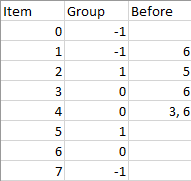Description
There are n items each belonging to zero or one of m groups where group[i] is the group that the i-th item belongs to and it's equal to -1 if the i-th item belongs to no group. The items and the groups are zero indexed. A group can have no item belonging to it.
Return a sorted list of the items such that:
- The items that belong to the same group are next to each other in the sorted list.
- There are some relations between these items where
beforeItems[i]is a list containing all the items that should come before thei-th item in the sorted array (to the left of thei-th item).
Return any solution if there is more than one solution and return an empty list if there is no solution.
Example 1:

Input: n = 8, m = 2, group = [-1,-1,1,0,0,1,0,-1], beforeItems = [[],[6],[5],[6],[3,6],[],[],[]] Output: [6,3,4,1,5,2,0,7]
Example 2:
Input: n = 8, m = 2, group = [-1,-1,1,0,0,1,0,-1], beforeItems = [[],[6],[5],[6],[3],[],[4],[]] Output: [] Explanation: This is the same as example 1 except that 4 needs to be before 6 in the sorted list.
Constraints:
1 <= m <= n <= 3 * 104group.length == beforeItems.length == n-1 <= group[i] <= m - 10 <= beforeItems[i].length <= n - 10 <= beforeItems[i][j] <= n - 1i != beforeItems[i][j]beforeItems[i]does not contain duplicates elements.
Solution
Python3
def topo_sort(predecessors, successors):
order = []
available = [i for i in range(len(predecessors)) if not predecessors[i]]
while available:
i = available.pop()
order.append(i)
for j in successors[i]:
predecessors[j] -= 1
if not predecessors[j]:
available.append(j)
return order
class Solution:
def sortItems(self, n: int, m: int, group: List[int], beforeItems: List[List[int]]) -> List[int]:
for i in range(n):
if group[i] == -1:
group[i] = m
m += 1
item_predecessors = [0] * n
group_predecessors = [0] * m
item_successors = [[] for _ in range(n)]
group_successors = [[] for _ in range(m)]
for i, (group_i, before_i) in enumerate(zip(group, beforeItems)):
for j in before_i:
item_predecessors[i] += 1
item_successors[j].append(i)
if group_i != group[j]:
group_predecessors[group_i] += 1
group_successors[group[j]].append(group_i)
item_order = topo_sort(item_predecessors, item_successors)
group_order = topo_sort(group_predecessors, group_successors)
if len(item_order) != n or len(group_order) != m:
return []
group_orders = [[] for _ in range(m)]
for i in item_order:
group_orders[group[i]].append(i)
return sum((group_orders[g] for g in group_order), [])